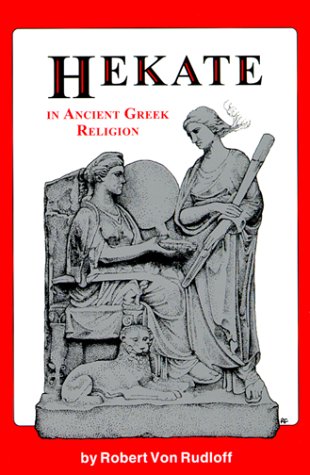|
Two books of the last decade have begun to redress our notions of
Hekate. This is not just mainstream opinions. Paganism and occultism
have both accepted previous opinions of Christianity and materialist
scholars.
Although the reputation of the Horned God has often been defended
against claims he is the Devil of Christianity, Hecate@#8217;s reputation
has tended to languish. The bad reputation she got from Christians
tends to hang around. With these two books, that problem can begin
to be corrected.The two books involved are:
I
Robert von Rudloff; Hekate in Early Greek Religion (Horned Owl
Press, 3906 Cadboro Bay Road, Victoria, British Columbia V8N 4G6,
Canada, 1996) Paperback 176 pages, illustrated, 6@#8221;x9@#8221;,
ISBN 0 9696066-8-0, US$17.95
Stephen
Ronan (ed); The Goddess Hekate: Studies in Ancient Pagan and Christian
ReligionAnd Philosophy Volume 1 (Chthonios Books, 7 Tamarisk Steps,
Hastings TN34 3DN,UK) 1992 Hardcover with dustjacket, 146 pages
b&w illos, 22x15.5cm, ISBN 0 948366-21-4 @pound;28.50
Reading these books, you are struck with a number of surprises.
Start with Rudloff@#8217;s first revelation. In her early period
Hekate was portrayed as young, not old, thereby confounding all
recent iconography of her. She is not a crone Goddess, though many
Pagans and virtually everyone else takes her as such. She is in
fact a Goddess of the liminal. She is a Goddess of transitions,
which I suppose makes her the Goddess of the Internet.
Rudloff well understands the sources he works with. He should, his
book is based on his Master@#8217;s thesis. But dry and stuffy this
volume isn@#8217;t. Ronan, by contrast, looks at Hekate@#8217;s
three phases of worship. As Ronan himself puts it in the introduction:,
@#8220;Hekate is arguably the most mysterious and formidable of
all the Goddesses of the ancient world. Although she is often
thought of today as the archetypal triple lunar deity, a glance
at her history reveals a Goddess who is much more complex, and
one with a broader and deeper range of symbolism.@#8221; (p. 5)
Hekate
started as a solar Great Mother in the region of south western Turkey,
became by Hellenistic times a Goddess of ghosts, magic, and the
moon, and by late Antiquity was Goddess of the Cosmic life-force
and soul-nourishing Virtues, but retained her terrifying aspect.
Yet, how many would put Hecate in Tiphareth on the Tree of Life,
rather than Yesod? I confess I would not. Then again, who would
have thought of Hekate as a liminal Goddess.
Hekate has no legends attached to her name and this may have a great
deal to do with her relative obscurity. Despite accusations otherwise,
the occult and Pagans are not in the business of fabricating myth.
Rather, they revive it. Yet Hekate was the Goddess to whom was consecrated
the place before the gate of the temple, or city, or house. She
was the Goddess who received offerings for herself and uneasy ghosts
every month at the crossroads. She was a Goddess guiding the worshippers
through dangerous and uncertain territories like birth and death
as well as those crossroads and doorways, as Ronan attests.
Ronan@#8217;s book is not the slickest presentation and it isn@#8217;t
cheap. But it is a book of some startling information. @#8220;...Chaldean
Hekate and her Greco-Roman counterpart were less closely related
than had been...assumed.@#8221; (p. 79) Indeed. The Hymns to Hekate
are a delight and @#8220;Chaldean Hekate@#8221; including the chart
@#8220;The Chaldean Universe@#8221; (p. 87) and subsection @#8220;A
Brief Analysis of the Chaldean Hierarchy@#8221; (pp. 88-89) will
be of great value to Pagans and practicing occultists, generally.
Will be, or should be. The truth is, though these books have been
available for six years and ten years, they have not made a great
impact on Paganism. Though Goddess worship has proliferated, Hekate
has not been a part of that Goddess. Though there are many, many
covens dedicated to a Goddess, it is Diana or Isis who claims their
attention. In fact I have never heard of a coven with Hekate as
the prime Goddess or even (among those who invoke pentads) one of
the Goddesses.
Yet a young Goddess of the liminal, a Goddess of the doorways seems
an ideal guardian Goddess. It is a shame that she has not been more
widely invoked. Perhaps Paganism has become a little too comfortable
with what it has, and a little bored with the Greek and Roman deities
it thinks it knows.
|

![]()
